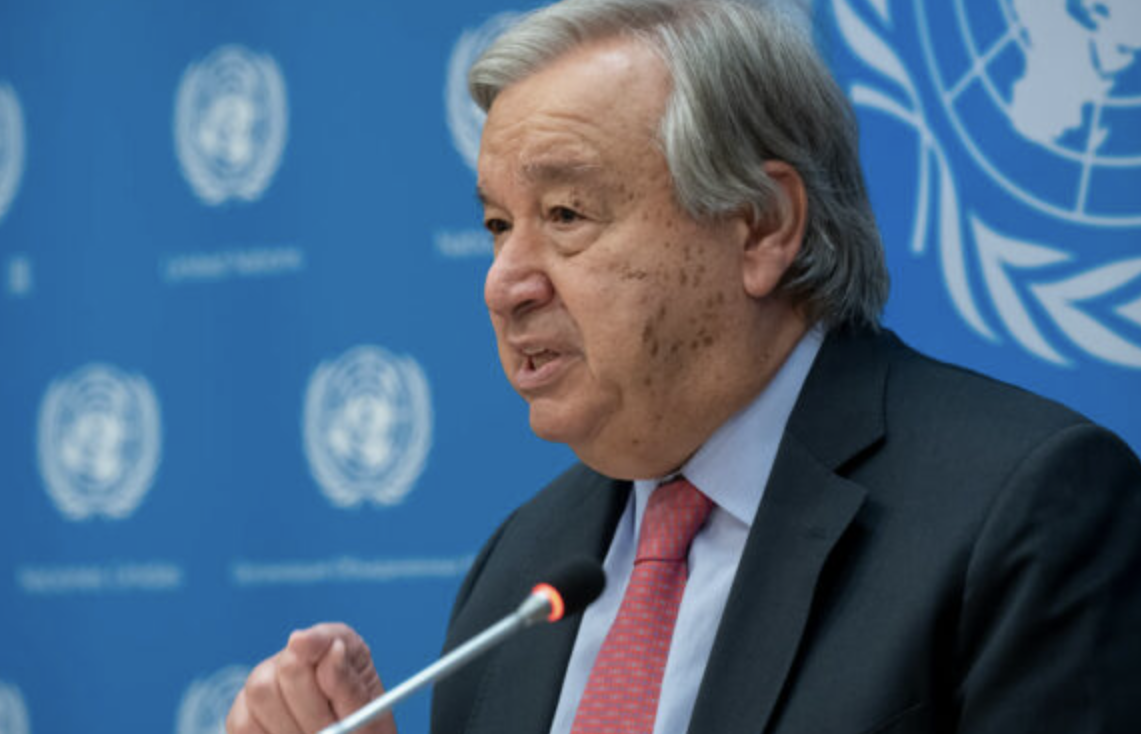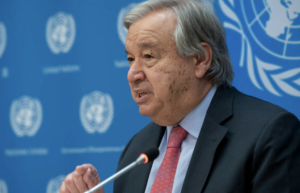Join Our Telegram channel to stay up to date on breaking news coverage
The United Nations Secretary-General has added to the list of voices advocating for the regulation of generative Artificial Intelligence (AI). He acknowledged the warnings posed by developers of the technology, urging the world to take them seriously.
UN Secretary-General Urges Global Action on AI
On Monday, UN Secretary-General Antonio Guterres held a press address on Policy Brief on Information Integrity on Digital Platforms where he underscored issues such as social media hate speech and disinformation as well as AI and its effects on the world.
“Alarm bells over the latest form of artificial intelligence – generative AI – are deafening. And they are loudest from the developers who designed it,” he said, adding:
“These scientists and experts have called on the world to act, declaring AI an existential threat to humanity on a par with the risk of nuclear war. “
“We must take those warnings seriously,” he stated advising the world to act on the many cautionary statements that have been put out by AI scientists about its dangers.
We must exercise caution to avoid creating a monster that will be impossible to govern, he warned.
In this speech, Guterres was referring to a Statement on AI Risk that was signed and published by many scientists, notable figures, and executives including Sam Altman, the CEO of OpenAI which is the creator of the famous ChatGPT.
In the statement, the group stated that “Mitigating the risk of extinction from AI should be a global priority alongside other societal-scale risks such as pandemics and nuclear war.”
A similar warning was also issued by Elon Musk in an open letter where he and all the other signatories asked that governments put a 6 months pause on all developments and experiments in the AI space that are more advanced than GPT 4.
He went on to recommend that the period be used to put in place regulations and protocols that will govern developments in the AI space to ensure that all advancements are safe for the human race.
Notably, there have been several attempts by organizations and governments to regulate the technology. One such move was by the EU which just passed what they refer to as the “world’s first-ever AI legislation”.
Making history by shaping our future.
This is what today’s groundbreaking vote on the world’s first ever #AI legislation is all about.
It is about Europe taking the lead in digital innovation. pic.twitter.com/jICNwcX9hy
— Roberta Metsola (@EP_President) June 14, 2023
The EU Artificial Intelligence Act, which includes a blanket ban on police use of live facial recognition technology in public places, was voted in by the EU Parliament on Wednesday by 499 members.
To help the UN charter forward regarding AI-related activities, Guterres declared he would establish and nominate members to an advisory council. The board would entail specialists in artificial intelligence and The International Telecommunication Union (ITU) and the Educational, Scientific and Cultural Organization (UNESCO) would each have representatives.
Additionally, the Secretary-General declared that he would support an AI organization whose role would be inspired by that of the International Atomic Energy Agency regarding nuclear energy.
Fighting Disinformation and Hate Speech
Despite the fact that AI has caused significant concerns in the world, the Secretary-General advised that attention should not be diverted from the harm that digital technology is already causing globally.
Given the surge in online hate speech and disinformation across social media platforms, Guterres said:
“The proliferation of hate and lies in the digital space is causing grave global harm. It is fueling conflict, death, and destruction now. It is threatening democracy and human rights now. It is undermining public health and climate action, now.It is undermining public health and climate action – now.”
As a start to a solution, the UN released a policy brief on Information Integrity on Digital Platforms in which they proposed a framework. The proposal is meant to help governments in coming together to create guidelines that promote facts and expose lies.
The framework would also help tech companies to navigate ethical and legal difficulties while supporting a healthy information ecosystem.
Related Articles
- SEC Plans to Introduce New AI Rules for Brokers in October
- AI Startup By Ex-Meta And Google Researchers Raises $113M In Seed Funding
- Missed XRP’s 23% Monthly Surge? yPredict’s AI-Powered Crypto Signal Platform Could Spotlight Next Big Penny Crypto
Best Wallet - Diversify Your Crypto Portfolio
- Easy to Use, Feature-Driven Crypto Wallet
- Get Early Access to Upcoming Token ICOs
- Multi-Chain, Multi-Wallet, Non-Custodial
- Now On App Store, Google Play
- Stake To Earn Native Token $BEST
- 250,000+ Monthly Active Users
Join Our Telegram channel to stay up to date on breaking news coverage


